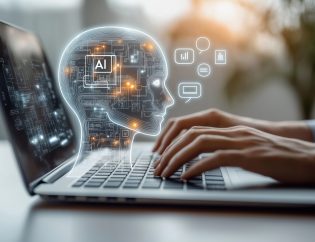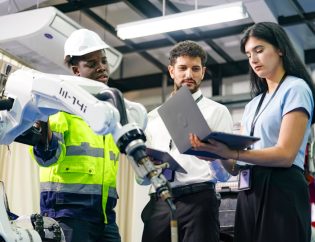What if the most diligent, unbiased recruiter on your team worked 24/7, never got tired, and could screen a thousand resumes in a minute? That's no longer science fiction; it's the new reality of AI in recruiting.
The accounting and finance sectors, often traditional and slow to adopt new technology, are facing a perfect storm. A persistent talent shortage combined with the rise of powerful, accessible AI tools like ChatGPT is forcing a rapid evolution in finance talent acquisition. Recruiters are under more pressure than ever to find top-tier talent faster and more efficiently.
With over 35 years of experience in recruitment, we've seen technologies evolve, but the core of what we do has always been about people. The integration of artificial intelligence and ChatGPT isn't just an efficiency upgrade; it’s a fundamental shift that empowers our recruiters to move from manual processing to becoming even more effective strategic advisors. This evolution is creating massive opportunities for those who master these tools and significant risks for those who don't. This post will explore how AI is transforming candidate sourcing, screening, and engagement, providing a roadmap for recruiters to become indispensable strategic partners.
The End of the Resume Black Hole: AI-Powered Sourcing and Screening
For years, the Applicant Tracking System (ATS) was a necessary evil, often filtering out great candidates because their resumes lacked specific keywords. That era is ending.
Beyond Keyword Matching
AI-powered Applicant Tracking Systems (ATS) and generative AI are moving past simple keyword searches. They can now analyze entire resumes and cover letters for context, skills, experience, and even infer soft skills, providing a holistic candidate summary. This is a game-changer for finding hidden gems. According to a 2025 study by Insight Global, 74% of hiring managers believe AI can accurately assess an applicant's skills for a role.
Don't forget this tip: Use AI to surface qualified candidates who might have been overlooked by traditional systems, especially those with non-linear career paths.
The Rise of the AI Co-pilot for Job Descriptions
How much time do you spend crafting job descriptions? ChatGPT for recruiters and similar generative AI tools can now generate highly optimized, inclusive job descriptions that attract a broader and more diverse pool of candidates.
Here’s a simple example of how an AI copilot can refine the language:
| Before (Traditional) | After (AI-Refined & Inclusive) |
| Seeking an aggressive, results-driven CPA with 10+ years of experience in financial reporting. Must be a rockstar who can handle pressure. | We're looking for an experienced Senior Accountant to join our collaborative team. In this role, you'll leverage your expertise in financial reporting to drive our company's financial transparency and success. |
Remember: Use generative AI to draft and refine job descriptions, but always review and humanize them to ensure they accurately reflect your company culture and the specific role.
The New Art of Candidate Engagement: From Manual Outreach to Hyper-Personalization
The best candidates, especially passive ones, have countless recruiters vying for their attention. Generic, automated messages get ignored. This is where AI's ability to personalize at scale, while still prioritizing the human touch, creates a massive advantage.
Automated, Human-Like Communication
AI chatbots and communication tools are now sophisticated enough to handle initial candidate inquiries, schedule interviews, and provide timely updates 24/7. From our perspective, by automating administrative tasks at the top of the funnel, AI enables our team to invest more time where it truly counts: building genuine, lasting relationships with high-value candidates. This focus on the human element dramatically improves the candidate experience by eliminating frustrating communication delays.
Learn How To Balance Technology and Human Touch in Recruitment here.
Tailoring Outreach for Top Talent
Generic outreach is dead. Generative AI can analyze a passive candidate's LinkedIn profile, work history, and online activity to help our recruiters draft a hyper-personalized message that speaks directly to that person's background and motivations. The key is using technology to enhance, not replace, the connection.
How do you ensure personalization doesn't get lost in automation? What's your secret to a successful cold outreach message?
Keep in mind: Train your team to use AI as a research and drafting assistant, not a replacement for human connection. The goal is to allow them to focus on building meaningful relationships with a smaller, more qualified pool of candidates.
The Ethical Compass: Mitigating Bias and Championing Human Judgment
With great power comes great responsibility. While AI offers incredible potential, its implementation requires a strong ethical framework and a commitment to the human side of recruiting.
The Promise and Peril of Algorithmic Bias
AI has the potential to reduce human bias in hiring, but it can also perpetuate and amplify existing biases if it's trained on flawed historical data. A recent SHRM report found that over 60% of HR professionals are concerned about bias in AI systems. The key is AI literacy and proactive oversight.
Consider this: Partner with AI vendors who prioritize transparency and provide tools for bias detection. Conduct regular audits of your AI-driven processes to ensure fairness and equity.
The Recruiter's Evolving Role
With administrative tasks automated, the modern recruiter's value shifts to the high-touch, strategic aspects of the job. With over 35 years in recruitment, we've seen many technologies come and go. Our view is that the future isn't about being replaced by AI, but about forming a powerful human-AI partnership. The recruiters who will continue to thrive are those who master the uniquely human skills that technology can't replicate: empathy, strategic thinking, and nuanced problem-solving. Your expertise in assessing cultural fit, understanding nuanced client needs, negotiating complex offers, and acting as a true business partner is now more critical than ever.
Don't forget: Invest in training that hones these "human-centric" skills. The future of recruiting is a powerful human-AI partnership.
Embrace the Change or Be Left Behind
AI and ChatGPT are no longer on the horizon; they are here, actively transforming resume screening, candidate engagement, and the very definition of a recruiter's role in the accounting industry. The choice is no longer whether to adopt AI, but how to do so strategically and with a human-first approach. Recruiters who fail to embrace this technological shift risk being left behind, while those who master it will position themselves as indispensable, high-value partners in a fiercely competitive market.
Ready to transform your recruitment process with AI? Contact us to learn how we can help you implement a human-centric, AI-powered strategy and get a complimentary audit of your current recruitment workflows.









